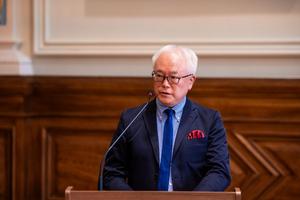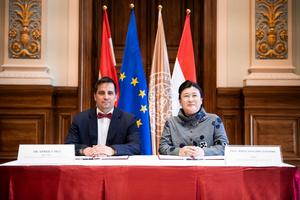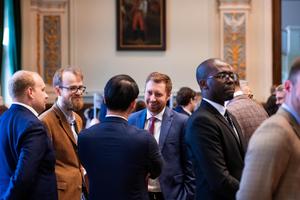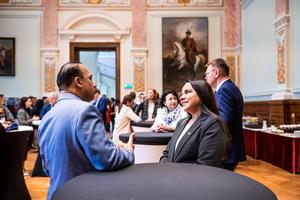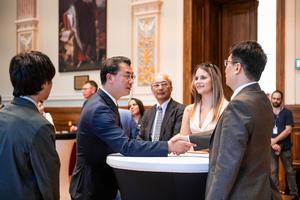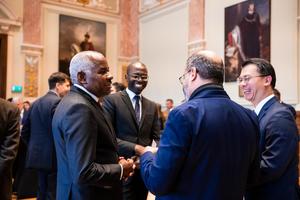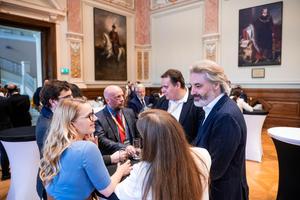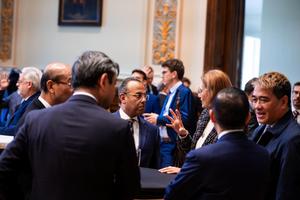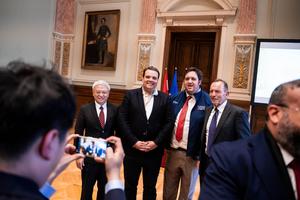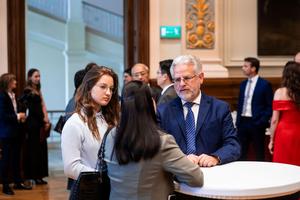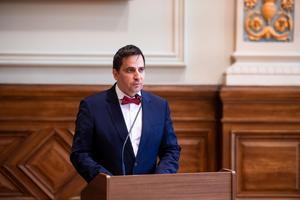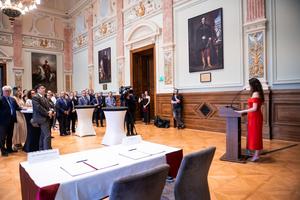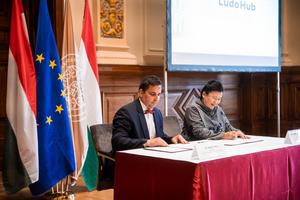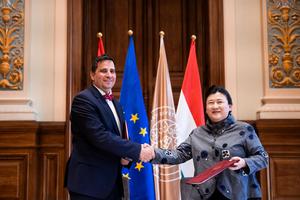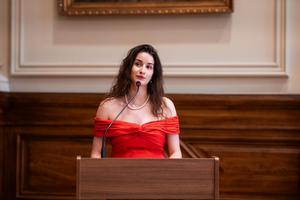On May 8, the Ludovika Public Diplomacy Hub was officially launched at the University of Public Service (LUPS) in Budapest. The new initiative aims to enhance Hungary’s international visibility and foster value-based dialogue on global affairs, connecting future leaders with renowned international voices.
The event was opened by Professor Tomohiko Taniguchi, inaugural fellow of the Hub, professor at the University of Tsukuba, advisor to the Fujitsu Future Studies Center, and former special advisor to Prime Minister Shinzō Abe. In a commanding keynote speech, Taniguchi declared, “Yes, it is indeed the Hungarian Moment.”
He described how the decades-long dominance of globalism is now unraveling, accelerated by the return of President Donald Trump to the global stage. “With the reemergence of President Donald Trump, the spell that had dominated our minds for nearly 35 years has been broken,” he said, tracing globalism’s ideological roots to the early 1990s and its consolidation in forums such as Davos.
Taniguchi criticized how globalism dismissed anything rooted in tradition, national identity, or biblical values, and how it paved the way for open borders, radical social ideologies, and the suppression of dissent. “If one did not accept the radical gender agenda, valued family, and loved the national anthem and flag, they were no longer considered democratic. This is why Davos and Brussels long disliked Hungarian Prime Minister Viktor Orbán,” he said.
In contrast, he emphasized that Hungary preserved its sovereignty and values while much of the West capitulated to ideological groupthink: “Many are beginning to see the value in Hungary’s path, once considered a European outlier. That is the Hungarian Moment.”
He also called for a renewed Japan-U.S. partnership, stressing that Japan must remain politically, economically, and spiritually independent, while becoming an “alliance multiplier” in the Indo-Pacific. “There is no MAGA without a JAGA,” he added, referring to the mutual importance of American and Japanese strength.
In his welcome address, Rector Gergely Deli emphasized the significance of the Public Diplomacy Hub in the university’s international strategy. “The Ludovika Public Diplomacy Hub opens a new chapter in our university’s international cooperation,” he said. “The world faces complex challenges—geopolitical tensions, technological shifts, climate change—and the only path toward sustainable solutions is cooperation, driven by shared will. This program is our contribution to building that will.”
He reminded the audience that the university’s historical mission remains firmly rooted in public service: “Today, we continue to train responsible public servants, leaders, and diplomats who understand and can respond to the most pressing global issues. Internationalization is not only about connecting academic communities—it is about shaping the decision-makers of tomorrow.”
Liliana Śmiech, Director General for International Affairs and the founder of the Hub, underlined the intellectual and strategic purpose behind the initiative. “There are no simple answers today—but we want to ask better questions, together,” she said. “This initiative opens a new door in a world where diplomacy must move beyond protocol and engage in meaningful exchange. Constructive cooperation is needed not only with allies, but with all nations. Universities have a duty to connect students with the world and its decision-makers, equipping them to lead with knowledge, ethics, and clarity.”
The Ludovika Public Diplomacy Hub blends the structure of a fellowship program with the dynamism of a policy platform. Through short-term residencies in Budapest, it will host leading international scholars, diplomats, and thought leaders who will engage in public lectures, closed-door policy dialogues, mentoring sessions, and collaborative research—addressing key topics such as sovereignty, freedom of expression, and security in a rapidly changing world.
As part of the broader occasion, a memorandum of understanding was signed between Josai International University and LUPS by Dean Maria Shiguemi Ichiyama and Rector Gergely Deli, further strengthening academic ties between Hungary and Japan.
The ceremony drew significant international attention, with representatives from more than 30 embassies and diplomatic corps in attendance—underscoring the growing global relevance of Hungary’s public diplomacy efforts.
The event concluded with a ceremonial toast beneath the portrait of Count István Széchenyi. As Śmiech remarked, “From the portrait above us, Széchenyi reminds us of what it means to build a forward-looking Hungary. This program will carry on his legacy—through dialogue, cooperation, and the shared pursuit of truth.”
